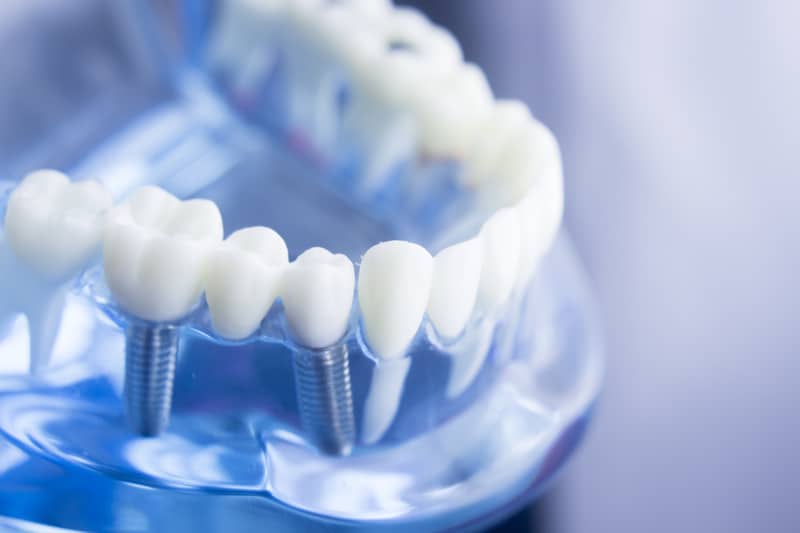Are Dental Implants Safe For Kids?


You’re at your teenage daughter’s basketball game. She has scored a few baskets and her team is winning. Then the game takes a turn for the worse when your daughter is elbowed in the jaw. She’s on the ground in pain, and when you finally get a close look at her mouth, you see a tooth is missing. What’s the best way to repair the damage? A new tooth? Are dental implants safe for children to get? Find out how your child can restore their smile!
Dental Emergencies
A knocked-out tooth is considered a dental emergency. These emergencies can be devastating to a person’s smile if they don’t get dental help immediately. Dental emergencies include: toothaches (especially if there is swelling), cracked tooth, broken tooth, knocked-out tooth, broken braces bracket or wires, or severe cuts to the tongue, lips or cheek. If a parent and/or patient doesn’t seek dental help immediately, they risk an oral infection or losing their tooth permanently.
The ideal way to handle a knocked-out tooth is to preserve the tooth in saline solution compatible with the human body. Get to Dr. Ania’s office as fast as possible to increase the chances of a successful re-implantation. If your child plays sports, keep a “Save-a-Tooth” kit on hand for such emergencies. This can help treat the affected tooth until you can get dental assistance. If the tooth can’t be re-implanted, your next thought might be a dental implant. Is this option safe for your child? And if not, what alternatives do you have?

What’s Are Dental Implants?
In centuries past, once a tooth was lost, it was lost for good. However, in today’s time, that’s not the case. Dental implants are a restorative dentistry option that allows patients to replace missing teeth with ones that look, feel and perform like natural teeth. They are the most effective, predictable, and longest-lasting option to replace one or multiple missing teeth. If one tooth is lost, patients should consider dental implants instead of a dental bridge. A dental bridge can replace several teeth missing in a row, but dental implants replace a tooth here and there.
You don’t want to have dental implants just for the fun of it, as it is a process to get them. When a tooth has been knocked out and can’t be fixed, dental implants may be necessary to restore a person’s smile. First, any remaining tooth particles are removed from the tooth socket. The area is cleaned and prepped to receive a screw. This screw will be placed in a person’s jawbone, where it will heal in place. At a separate appointment, a patient will have a custom-made tooth placed on top of the screw and it will remain there for 10-20 years. The new tooth is the dental implant.
Are Dental Implants Safe for Kids?
While dental implants are the best way to restore an adult’s smile, they are not the go-to option for children. This is because a patient will only want to have a dental implant if their jaws have completely stopped growing. Children and teens still have mouths that are changing and jaws that have not hardened completely. This happens when patients are in their older teen years and into their twenties.
Dental implants are not the best choice for children as they can shift out of place as a child’s jaw grows. It can cause crookedness to happen with the permanent teeth, pain and more. However, the American Academy of Implant Dentistry reports that implants are an option for adolescents once they have passed through puberty. Their standard guidelines are to wait until girls are at least 16 and boys are at least 18.
To fix your child’s smile, they can get a dental bridge. This is when a custom-made tooth is bonded to a natural tooth. The tooth will fill the tooth gap, but will not be implanted in the jawbone. Removable partial dentures are also an option, which is a dental device that has a custom-made tooth attached to it. If your child is fine with a gap in their smile for a time, they can get a space maintainer. This is great for young children, as it can keep a space open for a permanent tooth to grow in correctly.

Strong Smiles for Life
Your child can take amazing care of their teeth, but still have dental emergencies that happen in the blink of an eye. A dental emergency such as a broken, cracked, chipped or knocked-out tooth can happen much easier if oral hygiene habits aren’t happening enough. Brushing, flossing, and visiting the dentist are all habits that can help your child to have strong teeth.
The American Dental Association recommends that every patient (even toddlers) should see the dentist at least twice a year. There, they can get dental sealants and fluoride treatments to strengthen the teeth and protect them more than doing nothing. If a child brushes for 2 minutes at least twice a day (if not more), they can keep their teeth strong and avoid decay. Flossing the teeth cleans about 40% of the tooth surface, so it’s also something that should be done 1-2 times a day. Also reduce your child’s sugar intake—if possible—as sugar is the food that plaque needs to weaken teeth and cause decay.
Even though these habits may not protect them against a knocked-out tooth, it can reduce the chance of it and other dental emergencies because the teeth are stronger. Patients that practice good oral hygiene can also keep their teeth all throughout life, avoiding tooth loss. If you would like to know more about oral hygiene or our dental implants, call Dr. Ania’s office today at 303-443-0998!


